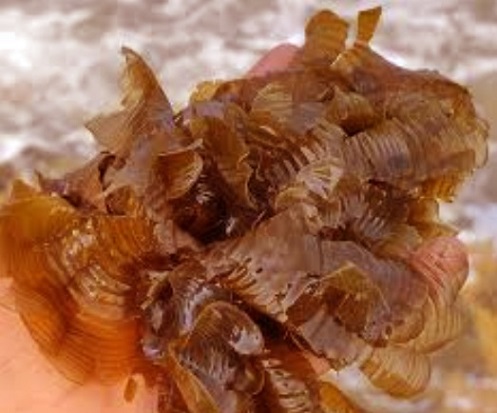Seaweed Polysaccharides Show Strong Promise in Blocking COVID-19 Virus from Entering Cells
Nikhil Prasad Fact checked by:Thailand Medical News Team Apr 18, 2025 1 day, 3 hours, 2 minutes ago
Medical News: In the ongoing search for affordable and effective antiviral treatments, researchers have turned their attention to the ocean. A new study reveals that certain compounds found in brown seaweeds might hold powerful properties to fight off the SARS-CoV-2 virus responsible for COVID-19.
 Seaweed Polysaccharides Show Strong Promise in Blocking COVID-19 Virus from Entering Cells
Seaweed Polysaccharides Show Strong Promise in Blocking COVID-19 Virus from Entering Cells
Image: Padina boergesenii seaweed
Scientists from Tanta University and the National Research Centre in Egypt, in collaboration with researchers from the University of Coimbra and the Instituto do Ambiente, Tecnologia e Vida in Portugal, have discovered that natural substances extracted from two types of brown seaweed—Padina boergesenii and Sargassum euryphyllum—can significantly inhibit the spread of the virus in laboratory settings.
Seaweed Versus the Coronavirus
While vaccines and antiviral drugs such as remdesivir remain the primary tools in combating COVID-19, many regions still struggle with access and affordability. This
Medical News report sheds light on a more natural and potentially cost-effective approach. Researchers focused on polysaccharides, which are sugar-based molecules commonly found in seaweeds, known for their bioactive properties.
After extracting and purifying these compounds from seaweed harvested off the Egyptian coast, the scientists tested their ability to stop SARS-CoV-2 in Vero-E6 cells—commonly used in antiviral testing. The polysaccharide extracted from Padina boergesenii demonstrated the most potent antiviral effects, with an IC50 (the concentration needed to inhibit 50% of viral activity) of just 24.2 µg/mL, compared to 29.3 µg/mL for Sargassum euryphyllum. These were benchmarked against remdesivir, which had a lower IC50 but also showed higher toxicity to cells.
Most strikingly, the Padina boergesenii extract had a favorable safety profile, with a CC50 (the concentration that harms 50% of cells) of 587.7 µg/mL and a selectivity index of 24.3, which indicates a strong therapeutic window.
How the Seaweed Compounds Fight the Virus
The researchers explored three ways in which the Padina boergesenii extract might stop the virus. The most effective method was virucidal activity—destroying the virus directly before it could enter cells—where it reduced viral activity by nearly 69%. The second was blocking viral adsorption, or stopping the virus from attaching to the cell, which resulted in a 57% reduction in viral spread. Lastly, inhibiting viral replication showed a 37% reduction, making it the least effective of the three.
These mechanisms were confirmed using rigorous lab techniques including viral plaque assays and advanced spectroscopy. Interestingly, these seaweed polysaccharides—especially those from Padina boergesenii—contain compounds like alginate and fucoidan, which are al
ready known to possess antimicrobial, antioxidant, and immune-boosting properties.
Why This Matters
The findings open up a new avenue in the fight against COVID-19, especially in low-resource areas. Unlike synthetic drugs, seaweed-derived polysaccharides are biodegradable, non-toxic, and relatively easy to produce. They also mimic molecules found in the human body, such as glycosaminoglycans, which may explain their ability to interfere with the virus’s ability to bind to and enter human cells.
The implications stretch beyond COVID-19. These types of natural compounds could potentially be adapted to treat other viral infections, including influenza, hepatitis, and herpes.
Final Thoughts
The researchers emphasize the need for further studies, especially in live animal models and eventually clinical trials in humans, before any of these seaweed-derived compounds could become approved treatments. However, their findings present a promising case for turning to nature in the development of future antivirals.
The study concludes that sulfated polysaccharides, especially those found in Padina boergesenii, can serve as powerful agents to block virus entry and even kill the virus directly. This could provide a much-needed therapeutic alternative in managing the global COVID-19 crisis, particularly in areas where current treatments are unavailable or unaffordable. The unique multi-targeted antiviral actions, low toxicity, and high efficacy make brown seaweed polysaccharides a strong candidate for further drug development against SARS-CoV-2 and potentially other viral threats.
The study findings were published in the peer reviewed journal Macromol.
https://www.mdpi.com/2673-6209/5/2/18
For the latest COVID-19 News, keep on logging to Thailand
Medical News.
Read Also:
https://www.thailandmedical.news/news/breaking-latest-german-study-reinforces-past-research-showing-iota-carrageenan-ability-to-inhibit-replication-of-all-sars-cov-2-vocs-
https://www.thailandmedical.news/news/breaking-u-s-study-finds-that-the-algal-polysaccharide-rhamnan-sulfate-from-monostroma-nitidum-can-be-an-effective-antiviral-for-covid-19
https://www.thailandmedical.news/news/marine-sulfated-glycans-inhibit-the-interaction-of-heparin-with-s-protein-of-sars-cov-2-omicron-xbb-variants
https://www.thailandmedical.news/pages/thailand_doctors_listings
https://www.thailandmedical.news/articles/hospital-news
Follow us on:
https://x.com/ThailandMedicaX
https://www.facebook.com/ThailandMedicalNews
https://bsky.app/profile/thailandmedical.bsky.social
https://gettr.com/user/thailandmedicalnews
https://www.tribel.com/thailandmedical/wall
and 33 other social media platforms
